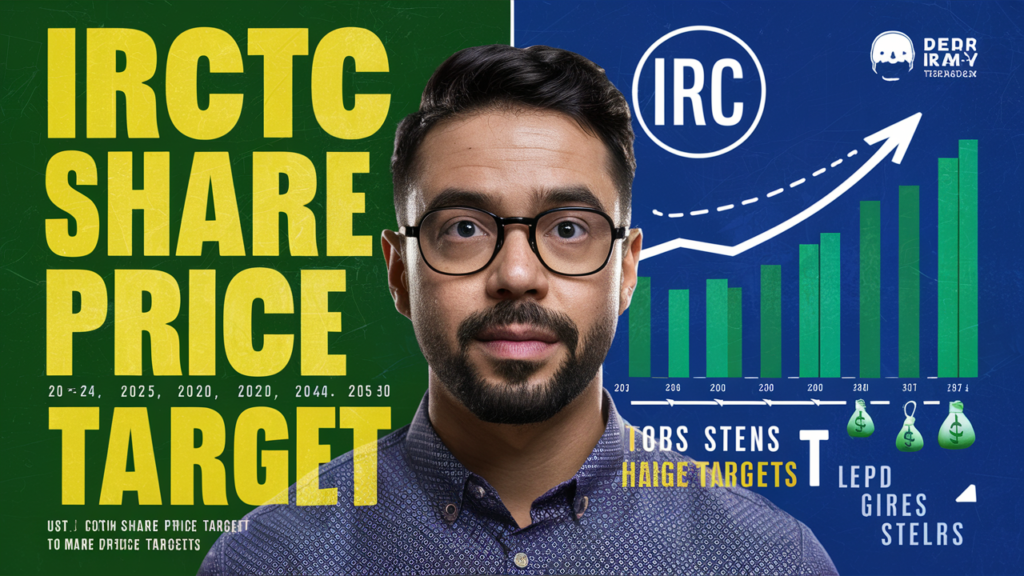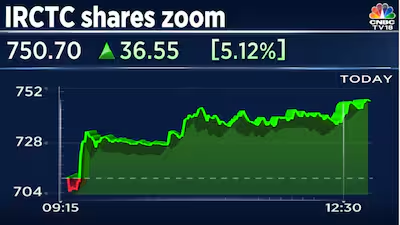Introduction to IRCTC and its Share Prices
If you’re keeping an eye on the stock market, chances are you’ve stumbled upon IRCTC’s share prices. The Indian Railway Catering and Tourism Corporation has transformed from a mere service provider to a dynamic player in the financial arena. With its shares often making headlines, understanding what drives these fluctuations is crucial for investors and enthusiasts alike.
Navigating through the intricacies of IRCTC’s share prices can feel like riding an emotional rollercoaster. Is it government policy shifts? Economic trends? Competition with other travel services? Each factor plays a role in shaping investor sentiment and market performance.
In this post, we’ll explore key influences affecting IRCTC’s share prices, delve into how recent events like COVID-19 have left their mark, and offer strategies for smart investing amid uncertainties. Whether you’re considering entering the market or are already invested in IRCTC shares, knowledge is your best ally here. Let’s dive deeper into what makes this company tick!
Factors that Influence IRCTC Share Prices

Several factors play a crucial role in determining the IRCTC share prices. One significant influence is government policies and regulations. Changes in transportation laws or travel restrictions can impact profitability.
Economic conditions also hold sway over market performance. A booming economy often leads to increased travel demand, thereby boosting revenue for IRCTC.
The competitive landscape cannot be overlooked either. With various modes of transport vying for passengers, shifts in consumer preference can affect IRCTC’s market share and stock values.
Company performance remains vital as well. Revenue growth, operational efficiency, and strategic initiatives shape investor confidence.
Technological advancements have transformed customer experiences too. Innovations that enhance service delivery can lead to higher user engagement and satisfaction.
External events like natural disasters or pandemics add another layer of complexity, creating unpredictable fluctuations in share prices that investors need to monitor closely.
A. Government Policies and Regulations
Government policies and regulations play a crucial role in shaping the IRCTC share landscape. Decisions made at both state and national levels can directly impact operational frameworks.
Changes in railway tariffs, for instance, influence revenue streams. If the government decides to adjust ticket prices or introduce new surcharges, it could sway investor sentiment significantly.
Additionally, regulatory changes regarding public-private partnerships may open new avenues for growth or restrict existing operations. Such shifts create ripples that investors must closely monitor.
Moreover, initiatives aimed at enhancing digital infrastructure within railways can boost user engagement and drive revenue growth through increased online bookings.
Investors need to stay informed about policy announcements since these factors often lead to immediate fluctuations in IRCTC’s stock performance. Understanding how legislation impacts this sector is vital for making sound investment decisions.
B. Economic Factors
Economic factors significantly impact IRCTC share prices. Economic growth can lead to increased disposable income among consumers, resulting in higher travel demand. When more people can afford to travel, the revenue for IRCTC typically rises.
Inflation plays a crucial role as well. Rising costs may squeeze profit margins if ticket prices don’t adjust accordingly. Investors keep a close eye on inflation rates, as these figures influence operational expenses and pricing strategies.
Interest rates are another key player in this equation. Higher interest rates could mean reduced consumer spending on leisure activities like traveling, thereby affecting IRCTC’s profitability.
Additionally, fluctuations in fuel prices can also sway investor sentiment since they directly affect transportation costs. All these economic indicators create a complex web of influences that investors must navigate when considering their stakes in IRCTC shares.
C. Competition in the Travel Industry
The travel industry is a dynamic and competitive landscape. IRCTC faces challenges not just from traditional rail services but also from various other modes of transportation. Airlines, for instance, offer quick alternatives for long-distance journeys.
Moreover, ride-sharing apps like Uber and Ola have transformed local travel options. These platforms provide convenience at competitive prices, enticing customers away from conventional transport methods.
Online travel agencies (OTAs) further complicate the scenario by bundling services such as flights and hotels. This creates attractive packages that might divert potential customers from railway bookings.
Additionally, the increasing popularity of self-drive rentals appeals to younger travelers seeking freedom on their trips. As this competition intensifies, IRCTC must innovate continually to retain its market share while adapting to shifting consumer preferences in an ever-evolving travel ecosystem.
D. Company Performance and Revenue Growth
Company performance plays a crucial role in determining IRCTC share prices. Investors closely monitor metrics like revenue growth, profitability, and operational efficiency.
An increase in ticket bookings directly influences revenue. When more travelers choose train services over other modes of transport, the company’s financial health strengthens. This uptick can lead to increased investor confidence.
Moreover, initiatives such as expanding digital platforms or enhancing customer service contribute significantly to overall performance. A seamless booking experience often translates into higher user satisfaction and repeat business.
Additionally, quarterly earnings reports serve as critical indicators for shareholders. Positive results generally boost share prices while disappointing figures may trigger declines. Hence, keeping an eye on these numbers is essential for anyone interested in IRCTC shares.
Investors should also consider how well the company adapts to market changes. Flexibility and innovation can drive sustainable growth amid challenges.
Impact of COVID-19 on IRCTC Share Prices

The COVID-19 pandemic brought unprecedented challenges to many sectors, with the travel industry being one of the hardest hit. IRCTC, as a leading player in Indian rail tourism and catering services, faced significant disruptions.
During lockdowns, passenger train operations were suspended. This led to a sharp decline in revenue for IRCTC. As travelers stayed home, share prices plummeted significantly.
However, as restrictions eased and vaccination drives picked up pace, there was a gradual recovery. The reopening of trains sparked optimism among investors. However, fluctuations persisted due to ongoing health concerns and changing regulations.
IRCTC’s adaptability became crucial during these times. Innovative measures like online ticketing enhancements helped regain consumer confidence gradually. Despite setbacks, the resilience shown by this company highlighted its potential for long-term recovery amidst uncertainty.
Strategies for Investors to Navigate Share Price Fluctuations
Investors looking to navigate the unpredictable waves of IRCTC share prices should adopt a multi-faceted approach. First, staying informed is crucial. Regularly following market news and updates about government policies can provide insights into potential price shifts.
Diversification also plays a vital role in managing risk. By spreading investments across various sectors, investors can mitigate losses from any single entity’s downturn.
Another effective strategy is setting clear entry and exit points based on thorough analysis rather than emotions. This disciplined approach allows for better decision-making amid volatility.
Additionally, using technical indicators like moving averages may offer valuable signals about trends and reversals in share prices.
Engaging with financial advisors or joining investment forums can enhance one’s understanding of market dynamics, providing fresh perspectives that might lead to smarter decisions over time.
Expert Insights on the Future of IRCTC Share Prices
Experts suggest that the future of IRCTC share prices hinges on several dynamic factors. One critical aspect is government policy, especially regarding railway modernization and digital initiatives. As the Indian Railways invests in infrastructure, IRCTC could see substantial growth.
Analysts also highlight the importance of economic recovery post-COVID-19. Increased travel demand can positively impact ticket sales and ancillary services offered by IRCTC.
Technological advancements, particularly in app development and customer engagement strategies, are expected to play a significant role too. Enhanced user experience may drive higher revenue streams.
Moreover, competition from other transportation sectors remains a constant challenge. The ability of IRCTC to adapt and innovate will be vital for maintaining its market position.
Investors should keep an eye on these evolving trends as they navigate potential opportunities within this ever-changing landscape.
Conclusion: Making In
Investing in IRCTC shares offers both opportunities and challenges. Understanding the dynamic factors that influence share prices is crucial for any investor.
Staying informed about government policies, economic conditions, and competition can provide insights into potential market movements.
Moreover, keeping an eye on technological advancements within the travel industry could signal future growth or setbacks for IRCTC.
COVID-19 has significantly impacted investor sentiment; however, recovery trends indicate resilience in this sector.
Taking a proactive approach with regular portfolio assessments will help you navigate fluctuations effectively.
Networking with financial experts can also enhance your understanding of market dynamics surrounding IRCTC shares. Engaging in discussions may uncover valuable perspectives that aren’t immediately apparent through research alone.
Being vigilant and adaptable will empower you to make informed decisions as you explore investment avenues related to IRCTC shares.
Introduction to IRCTC and its Share Prices
The Indian Railway Catering and Tourism Corporation, more commonly known as IRCTC, plays a pivotal role in India’s travel sector. As the digital face of Indian Railways, it manages online ticketing services and catering for travelers.
IRCTC shares have attracted considerable attention since their initial public offering (IPO) in 2019. Investors quickly recognized its potential due to the growing demand for rail travel and tourism in India.
Fluctuations in share prices often reflect broader market conditions, government policies, and changes within the company itself. Understanding these variables is crucial for anyone looking to invest or track IRCTC’s financial performance over time.
With advances in technology facilitating easier access to tickets and improved customer service features, many anticipate further growth ahead. The company’s proactive approach can lead to exciting opportunities for investors willing to navigate its dynamic landscape.
Factors Affecting IRCTC Share Prices
The share prices of IRCTC are influenced by a multitude of factors. Government policies play a crucial role, especially those about railways and tourism. Regulatory changes can either bolster investor confidence or create uncertainty.
Economic conditions also significantly impact share values. When the economy thrives, travel demand rises, thus benefiting IRCTC’s revenues. Conversely, economic downturns lead to reduced discretionary spending on travel.
Competition in the travel sector cannot be overlooked. Alternatives like budget airlines and private transport services provide customers with more choices, affecting ticket sales for Indian Railways.
Company performance is another critical factor. Revenue growth and profitability directly correlate with stock performance; investors keep an eye on quarterly earnings reports for insights into prospects.
Unexpected events such as natural disasters can disrupt operations and influence consumer behavior, leading to fluctuations in IRCTC shares.
Political Influences
Political influences play a significant role in shaping IRCTC’s share prices. Government policies directly affect the railway sector, and any changes can lead to immediate market reactions.
For instance, budget allocations for railways often signal growth or decline. Increased funding may boost investor confidence, while cuts could cause concern.
Additionally, regulatory decisions impact operational efficiency. Stricter regulations might increase compliance costs but ensure safety and quality.
Political stability also matters. A stable government tends to foster a favorable environment for businesses like IRCTC. Conversely, political unrest can create uncertainty and volatility in share prices.
Investors closely monitor announcements from key ministries related to rail transport. These updates can provide hints about future performance and influence buying or selling decisions rapidly. Understanding these dynamics is crucial for anyone looking at IRC shares as part of their investment strategy.
Economic Conditions
Economic conditions play a crucial role in shaping the IRCTC share landscape. When the economy thrives, disposable income rises, leading to increased travel demand. This surge directly impacts revenue for IRCTC.
Conversely, during economic downturns, consumer spending tightens. People tend to cut back on travel expenses, which can result in lower ticket sales and reduced profits for IRCTC. Investors often keep an eye on GDP growth rates and unemployment figures as indicators of market health.
Inflation also casts its shadow over share prices. Rising costs can squeeze profit margins if ticket prices do not adjust accordingly.
Currency fluctuations add another layer of complexity by affecting operational costs and international travel dynamics. Each of these elements weaves into the fabric of investor sentiment surrounding IRCTC shares.
Competition from Other Transportation Services
The travel industry is brimming with options. IRCTC faces fierce competition from various transportation services, including airlines and bus operators.
Low-cost carriers often lure travelers with attractive fares and quick journeys. This has made it essential for IRCTC to adapt its pricing strategies while enhancing service quality.
Ride-sharing apps also enter the fray, providing convenient last-mile connectivity that complements train travel. Consumers now have a spectrum of choices at their fingertips.
Moreover, luxury bus services appeal to those seeking comfort on shorter routes. With such variety available, maintaining customer loyalty becomes challenging.
IRCTC must continuously innovate and diversify its offerings to stay relevant in this competitive landscape. Enhanced user experiences through technology can help carve out a niche amidst these alternatives.
Technological Advancements
Technological advancements are reshaping the travel landscape, and IRCTC is at the forefront of this evolution. Innovations such as mobile applications and online ticketing systems have revolutionized how passengers book their journeys.
With user-friendly interfaces, travelers can now check train schedules or make reservations in a matter of seconds. This convenience attracts more users to the platform, boosting overall revenue.
AI and big data analytics also play crucial roles. By analyzing customer behavior and preferences, IRCTC can tailor services to enhance user experience. Predictive maintenance for trains is another game changer, ensuring fewer delays and higher reliability.
Cybersecurity measures ensure that sensitive information remains protected. As technology progresses, investing in robust infrastructure becomes vital for maintaining trust among its users.
These technological strides not only improve operational efficiency but also help solidify IRCTC’s position against competitors in an ever-evolving market landscape.
Effects of Natural Disasters
Natural disasters can significantly disrupt operations for companies like IRCTC. Floods, earthquakes, or severe storms affect not only the infrastructure but also customer travel patterns.
When railways are damaged, service interruptions occur. These disruptions lead to immediate drops in revenue and passenger counts. Consequently, investor confidence may wane as uncertainty looms over recovery timelines.
Additionally, natural calamities can escalate operational costs. Repairing damaged facilities and rolling stock requires substantial investment. This financial strain could deter potential investors from buying into IRCTC shares during turbulent times.
Furthermore, such events often trigger shifts in government policy regarding transportation safety and disaster preparedness measures. These changes might alter the competitive landscape in which IRCTC operates.
As environmental concerns grow alongside climate change awareness, companies must adapt their strategies accordingly to mitigate risks associated with natural disasters.
Impact of COVID-19 on IRCTC Share Prices
The COVID-19 pandemic had a profound impact on the IRCTC share prices. As travel restrictions were imposed, demand for rail services plummeted. This sudden decrease left investors anxious and led to significant fluctuations in stock value.
In early 2020, IRCTC saw its shares drop sharply as revenues dwindled. With trains operating at reduced capacities or being temporarily suspended, market confidence diminished rapidly.
However, during the latter part of 2020 and into 2021, signs of recovery emerged. The gradual resumption of train services brought back some positivity among investors. Innovations like online ticket booking became even more critical during this time.
Despite these challenges, many analysts noted that IRCTC has the potential for long-term growth post-pandemic as travel resumes globally. Investors are now closely monitoring how effectively the company adapts to changing circumstances in a recovering economy.
Tips for Navigating Fluctuating IRCTC Share Prices
Stay informed about market trends. Regularly check news related to IRCTC and the travel industry. This knowledge can help you anticipate shifts in share prices.
Consider diversifying your portfolio. Investing in a variety of stocks can reduce risk if IRCTC experiences volatility. A balanced approach may cushion against sudden downturns.
Utilize stop-loss orders strategically. These tools allow you to set a selling price for shares, minimizing potential losses during dips.
Engage with financial experts or analysts who focus on transportation sectors. Their insights can provide valuable perspectives on future movements.
Monitor government policies affecting railways and tourism, as they directly influence performance metrics for IRCTC shares. Changes here could lead to immediate price adjustments.
Be patient and avoid panic selling during short-term fluctuations. Staying calm helps maintain clarity in decision-making during turbulent times.
Conclusion
Navigating the complexities of IRCTC share prices requires a keen understanding of various influencing factors. As we’ve explored, government policies and regulations play a crucial role in shaping market sentiment. Economic conditions also significantly impact investor confidence and spending habits.
The travel industry is highly competitive, with various transportation services vying for consumer attention. This competition can affect pricing strategies and ultimately influence IRCTC’s market position. Company performance remains paramount; consistent revenue growth can bolster investor trust while financial setbacks may lead to volatility.
The ongoing effects of COVID-19 cannot be overlooked either. The pandemic reshaped travel patterns and brought about uncertainties that still linger in the sector today.
For investors looking at IRCTC shares, staying informed about these dynamics is key to making educated decisions amidst fluctuations. Being agile and adaptable will help navigate this ever-changing landscape effectively.
As we look ahead, there are both challenges and opportunities on the horizon for IRCTC share prices. Keeping an eye on economic indicators, policy changes, technological advancements, and competitive movements will be essential for any savvy investor aiming to make informed choices in this unique market environment.




